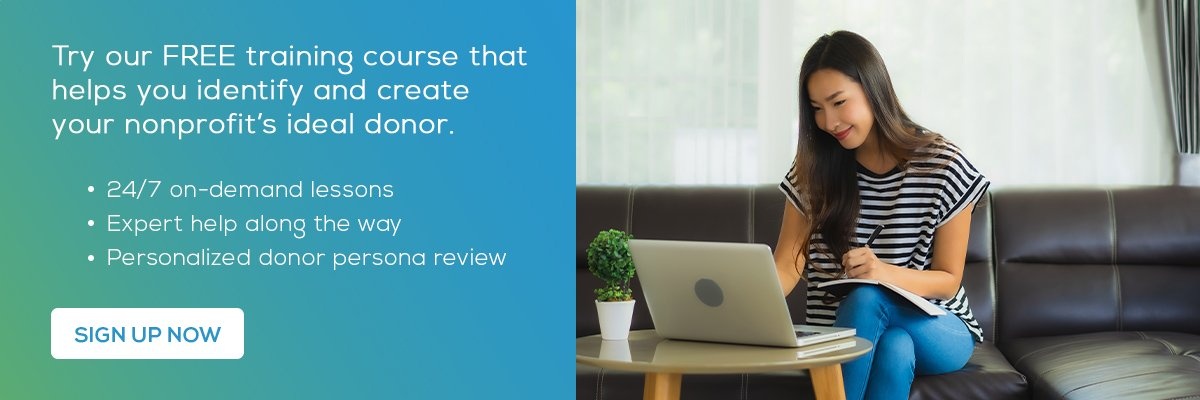Have you ever felt like you’re aiming in the dark when it comes to your marketing messaging? It’s common for nonprofits to feel like they’ve created strong campaigns that aren’t yielding the expected results—especially when they haven’t already created a portfolio of donor personas.
Knowing who you’re pitching a message to is the most important factor when it comes to creating effective campaigns—and strong, accurate donor personas are your best tool for achieving that goal.
But how do you reach out to current and past donors without any awkwardness, while also ensuring you get valuable intel out of the effort?
Use these tips to help find willing interviewees and guide your preparations.
Identifying Good Interview Candidates
Strong donor personas depend on having good information about every type of donor your organization deals with. Additionally, team members and volunteers are vital to this effort, since they’re often donors themselves and can provide valuable information about what drove them to support you so strongly.
Segregate your support base into relevant categories like one-time donors, recurring donors, past donors, etc. Do the same for your volunteers and in-house teams, then try to get at least 3-5 interview subjects from each category.

Finding Participants for Donor Persona Interviews
It’s common to feel awkward about contacting donors directly, especially with the fear that they’ll assume you’re asking for more donations. But remember that these are people who’ve already agreed to support your cause, so as long as you’re quick to lay out the context of your contact, they’ll probably be eager to hear you out.
Research has shown that most donors are strongly motivated by their personal perspective on your cause and appreciate personal outreach, so being singled out for an interview should be a boon in most cases.
Here are a few tips to smooth the process of finding interview candidates:
Existing team members and volunteers are important when creating donor persona portfolios, so always make sure to ask them in person, when possible. They’ll appreciate the personalized touch and will be more likely to agree to participate.
However, when it comes to non-team donors, it’s better to be unobtrusive and reach out through more traditional avenues. Always start with a phone call, since you’re more likely to get a “yes” from somebody you’re speaking with directly.
If that’s not an option, or you’re not getting a response, you can move on to email contacts—or social media outreach for younger demographics.
To increase your response rates, always introduce yourself by acknowledging their support. Here's an example:
“I wanted to reach out because you’re a valuable member of our donor community, and we’re hoping to gain insight into your experience with our cause.”
Start With Thanks
Once you’ve made contact, always thank them first—for both their willingness to speak with you now, and for their past support.
Be specific about their role with your organization and directly reference whatever action they took—whether that’s donating, volunteering, or being a member of your in-house team.
You can remind them of their contribution to your cause by saying something like this:
“We deeply appreciated your volunteer efforts at last year’s fundraiser, and I wanted to personally thank you for the support that helped us exceed our goal.”
Explain the Interview’s Purpose
The key to defusing any potential tension is to immediately make it clear that you’re not soliciting new donations. After the initial introduction, explain that the purpose of your outreach is to conduct a donor interview to improve your marketing efforts.
Keep it brief but explanatory, like this:
“We’re trying to improve our outreach to ensure we can find more people as dedicated to our cause as you’ve been, and we think your experience can provide some valuable insight.”
Establishing transparency right away is the best method to build trust and encourage the interviewee to let their guard down.
Be Flexible with Your Schedule
While some contacts might be available for an immediate interview, more often you’ll need to schedule a future conversation. In that case, you should offer complete flexibility to reduce any pain-points that could lead to a declined invitation.
Start with something similar to this:
“We understand how valuable your time is, so I’m happy to accommodate your schedule! Most chats last around 15 to 30 minutes, so we can schedule an interview whenever it’s convenient for you.”
Always offer to schedule a phone call first, since it’s best to speak directly. Many modern donors are also amenable to a video chat, which is just as effective. If they decline or seem hesitant, you can offer to send a survey through email or standard mail instead.
Incentivize Your Interviewees
If a prospective interviewee seems hesitant to make a firm appointment, offer an incentive like gift cards, marketing swag, or free tickets to an upcoming event.
Rather than framing it as a direct quid pro quo, simply read their reaction and say it unprompted like:
“We really appreciate your time, so I’d love to offer you a gift card at the conclusion of our discussion.”
If hesitant subjects become a theme of your efforts, it’s probably best to start offering the incentive at the very start of your conversations.
Prepare Pre-Interview Material
While your interviewers obviously need to be prepared beforehand, the same is often true of interview subjects. Asking a question that an interviewee doesn’t know how to answer can eat up a lot of precious minutes, and before you know it the “quick” interview has turned into a slog.
To prevent this, it’s a good idea to send your subjects a brief summary packet of the questions you’ll be asking, so they can look them over and think about their responses before the formal interview begins.
Make it seamless by concluding your initial outreach by saying something like:
“Thanks for agreeing to speak with me! I’ll send a quick summary of the areas I’m curious about to your email—feel free to look it over and give it some thought before we speak again.”
Interview Preparation Improves Results
Once you’ve smoothed the pain-points for prospective interviewees and framed their participation as support for your cause, valuable insight is right around the corner. Donor personas are only as strong as the interviews you used to create them, so getting it right from the start is the best way to maximize the value you’ll generate in the process.

